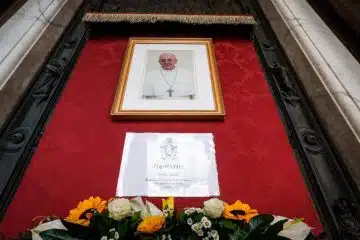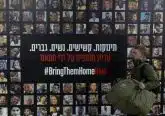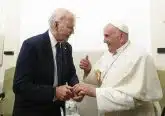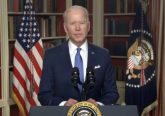Afghan Christian’s plea to CNA: ‘You are my last hope’
by Shannon Mullen
Washington, D.C. Newsroom, Sep 8, 2021 / 15:12 pm
He says the Taliban executed his father. And his brother. Now, they are hunting for him.
“Please do something,” he wrote in a plea to CNA.
He is a young Afghan, one of countless thousands still desperate to escape his country.
He is a doubly marked man. First, because he briefly worked for the U.S. military and other allied forces. Second, because he is a Muslim convert to Christianity. That is a capital crime in Afghanistan.
“I hope you save my life.”
His pseudonym is Kareem. CNA can’t publish his full name because of the peril he faces.
Kareem first contacted CNA Aug. 24. By that time, he had bid a painful goodbye to his family and joined throngs of other Afghan civilians at the gates to Hamid Karzai International Airport in Kabul, the Afghan capital.
Along the way, he said, his mother called him with the news that the Taliban had killed his father and brother because both men, who were Muslim, had worked with allied forces during the war.
Kareem shared his passport and other documents with CNA to corroborate his identity. Since then, two CNA officials — Kelsey Wicks, the news outlet’s operations manager, and Alejandro Bermudez, CNA’s executive director — have kept in regular contact with Kareem via email and WhatsApp, an instant messaging platform, while working in concert with humanitarian aid groups, religious liberty leaders, and others to try to help him.
‘You are my last hope’
CNA’s efforts on Kareem’s behalf are part of a larger story that has unfolded behind the scenes during and after the U.S. government’s chaotic air evacuation of American citizens, journalists, military personnel and endangered Afghan civilians.
More than 120,000 people were flown out of Kabul prior to the completion of the U.S. pullout Aug. 31, the U.S. government says. To date, some 40,000 Afghan refugees have arrived at U.S. military bases in the United States.
But countless other endangered Afghans, including many Christians like Kareem and others in the Taliban’s crosshairs, were left behind.
In the frenzy leading up to the Biden administration’s Aug. 31 exit deadline, Afghan civilians and their advocates turned to aid groups, well-connected insiders, and anyone else they could think of asking for help, before it was too late.
Their questions followed a similar script. Do you know anyone who can help? What about Glenn Beck’s planes? What do you know about the Pineapple Express?
“We’re getting desperate calls, either from Afghanistan or from people who are getting them from Afghanistan, and we’re all reaching out to all of our contacts,” Susan Yoshihira, a former U.S. Navy helicopter pilot who heads a non-profit humanitarian organization, the American Council on Women, Peace, and Security, told CNA Sept. 3.
In many instances, this fevered networking has yielded positive results.
A group of nuns from the Missionaries of Charity and the disabled Afghan children they cared for were rescued and flown to Italy, for example. And an Afghan high school girls robotics team managed to make it to Qatar, and some all the way to Mexico.
Yet in the tense countdown to the final U.S. pullout, such happy outcomes were offset by the gnawing realization that there simply wasn’t enough time or back-channel leverage to help countless others like Kareem.
“Everybody’s exhausted,” Yoshihira said. “They haven’t slept, they’re tired, they’re fraught, they’re getting frantic, desperate emails.”
Kareem sent one of those desperate pleas to CNA.
“Please help me,” he wrote. “I have no one without you. You are my last hope.”
Helping a ‘brother in Christ’
Helping Kareem is complicated for a number of reasons.
While he worked at a U.S. military base, he was employed there for less than the one year of service time required to receive a Special Immigrant Visa for Afghans who were employed by or on behalf of the U.S. government.
And even if he had worked the necessary time frame and had all the required documents to prove it, the U.S. Embassy in Kabul that was processing visa requests has closed.
Additionally, it is possible Kareem could make a case for what is called a Priority 2 (or P-2) visa, which applies to vulnerable “minority populations,” among others, but that eligibility category does not explicitly mention Christians or other religious minorities, a fact that has sparked widespread criticism.
For Wicks, CNA’s operations manager, Kareem’s plight lent a deeply personal dimension to the raw humanitarian disaster she saw unfolding in the news.
“This man is our brother in Christ, and in his humanity, and he deserves all the love, the time, the attention in assisting him to safety that any member of our family would,” Wicks explained.
Kareem’s pleas to CNA coincided with rising aggravation with the Biden administration among refugee advocates for what they saw as a lack of resolve to help vulnerable Christians get out of Afghanistan.
“I’ve got a list of hundreds of individuals desperate to get out … now being hunted by the Taliban or other groups,” Sam Brownback, the Trump administration’s religious freedom ambassador, told Real Clear Politics last week.
Two charities headed by conservative commentator Glenn Beck, The Nazarene Fund and Mercury One, raised more than $28 million to charter 20 airliners capable of ferrying thousands of Afghan Christians to safety.
But Beck repeatedly charged that officials within the State Department and the U.S. military were obstructing the airlift, though he said that the charities still managed to fly some 5,100 Afghan Christians and other civilians to countries other than the United States. Beck’s rescue claims have not been independently verified.
More recently, others have made similar allegations about State Department interference in charter flight rescue operations. A Sept. 6 report by Fox News cited three aid group officials who said they have been unable to secure the necessary approval from the State Department to land charter flights in a nearby country.
And Rep. Rep. Dan Crenshaw, R-Texas, who served on a Navy SEAL team in Afghanistan, made the same claim in a series of tweets last week.
The State Department has denied that it is obstructing refugee charter flights, and on Sept. 7 Secretary of State Anthony Blinken pledged to assist non-government organizations and other groups working to transport Afghan civilians out of the country. Yet Blinken acknowledged that the logistics of doing so have become more difficult since the U.S. withdrawal.
“Without personnel on the ground, we can’t verify the accuracy of manifests, the identities of passengers, flight plans, or aviation security protocols. So this is a challenge, but one we are determined to work through. We’re conducting a great deal of diplomacy on this as we speak,” Blinken said during a visit to a refugee staging facility in Doha, Qatar.
Stuck outside the Kabul airport’s Abbey Gate, the main checkpoint for evacuees, Kareem was convinced prior to the Aug. 31 deadline that his life hinged on getting on one of the U.S. military and civilian airplanes he watched taking off, one by one, some only half-full.
“Please help me,” he wrote in his first email to CNA.
“I will be shot or hang(ed) I don’t know but talibaans looking also for afghans converted to christians. They will find me. I am begging you for help, any kind of help. I don’t want to die. Save my life.” (CNA has edited some of the punctuation in his messages for clarity.)
On the morning of Aug. 27, Wicks was exchanging messages with Kareem when she began receiving news bulletins about a suicide bombing at the Abbey Gate, the same location where Kareem was waiting for a miracle.
“There has been a blast at the airport,” Wicks wrote.
“Are you okay?
“[Kareem] are you there?”
There was no response.
The suicide bomb attack by a regional affiliate of the Islamic State, ISIS-K, killed 13 U.S. service members and more than 100 Afghans. Scores more were injured.
An hour passed with no word from Kareem. Then two. Then three.
Wicks feared the worst.
Finally, a new message flashed on her laptop screen.
“Yes I here still hoping after blast on refugees gate. I was on that gate at morning.”
“Oh my gosh,” Wicks wrote back. “I thought you were dead.”
“No I got lucky or maybe your prayer,” Kareem replied. “I would send pictures but talibaans beating people.”
Hours later, Wicks received a voice message from Kareem. He said he was hiding in the corner of a building near the airport.
In the brief recording, his weak voice is shot through with loneliness and fear.
“I am so hopeless that there is no one coming for me, to help me and save my life,” he said.
‘What will they do to me?’
Kareem’s despair deepened as the hours and days passed by, with no fresh hope of rescue.
In one especially trying period, Kareem developed a fever and began to consider surrendering himself to the Taliban.
“Please do some thing,” he wrote.
“Does Christian Life matters or not,” he asked. “I am suffering every hour every day. I don’t know what Jesus decided for me.”
Wicks and Bermudez tried to encourage him to hold on, and continued reaching out to their contacts. “We keep working and fighting. Stay hopeful, brother,” Bermudez wrote.
But Kareem was terrified. His mind fixated on rumors that the Taliban were torturing people with what he called “skin punishments.” At one point, Taliban soldiers were whipping people outside the airport gates with cables, the Wall Street Journal reported.
“Taliban Wolfs are around me. They will hunt and eat me,” he wrote. “My heart is swelling. What will these animals do to me? Oh god,” he said.
“I am a human. I have rights. I am a human,” he wrote. “I’m not ready to die. I want to live my life.”
Wicks said later compared her experiences communicating with Kareem with keeping vigil at the bedside of a loved one preparing for death.
“Each of us is called to accompany the Suffering Christ. It might be someone you’re close to, someone in your family,” she said.
“God, in his Providence, asked that it be this person, 5,000 miles away.”
It was difficult “to encounter such darkness and to see the depths of this evil so closely, that a man would be hunted for his faith,” she said.
Kareem, for his part, clung to his human lifeline. “Please just stay with me [a] little more. Just talk to me,” he wrote.
Kareem remains in periodic contact with CNA, but it is now too dangerous for him to communicate on WhatsApp, especially in English.
Wicks and Bermudez continue to advocate for him, but there is little else they can offer him now other than their prayers.
Kareem told Wicks and Bermudez he is grateful for their efforts to help him.
“You two [are] keeping me hopeful and strong these scariest days of my life,” he wrote.
“I wish Jesus give me more life to meet you one day,” he continued.
“I will never blame you for this. You tried everything possible I know,” he told them.
“I love you two and others who tried to help me.”
Most recently, Kareem sent a video message to CNA, asking that it be made public if he should die.
“It is hard to survive in this hell, because this land is not for Christians,” he says in the nearly 8-minute-long video.
He says that the Taliban have the names of Christian converts whom they are hunting.
“I know I am one on that list,” he says. “But I’m not afraid. Jesus is with me … Jesus is watching me.”













